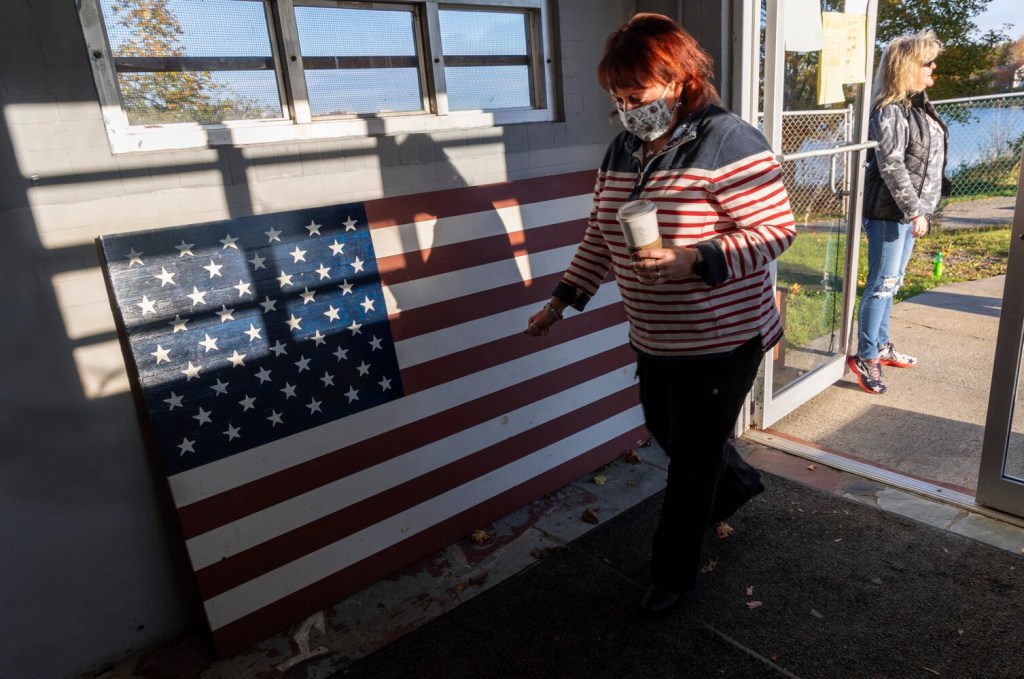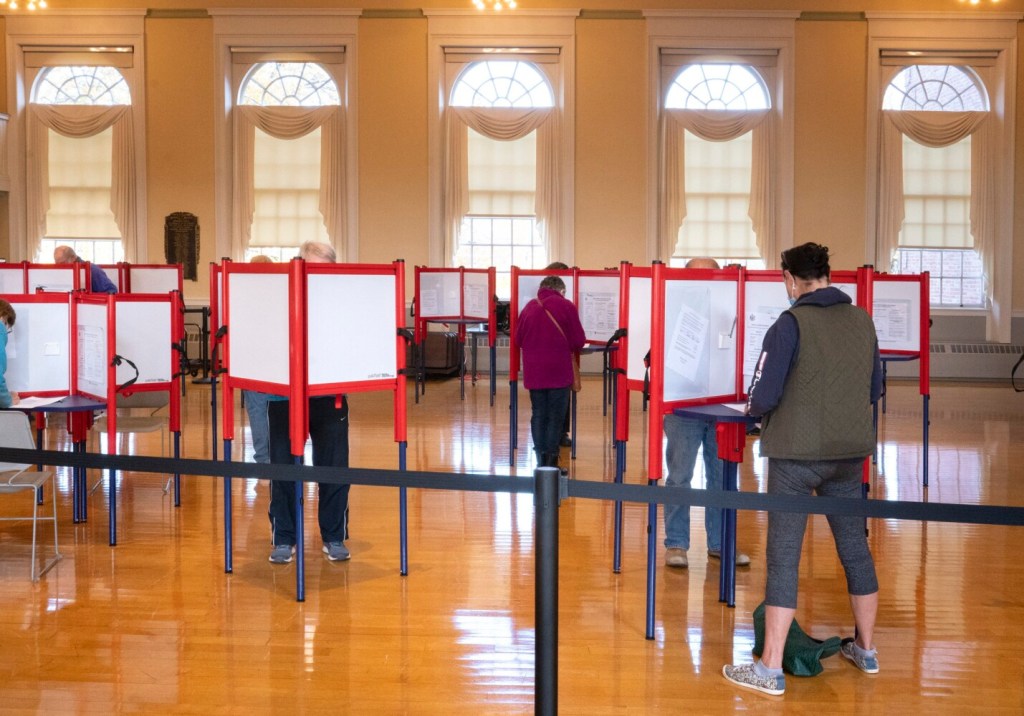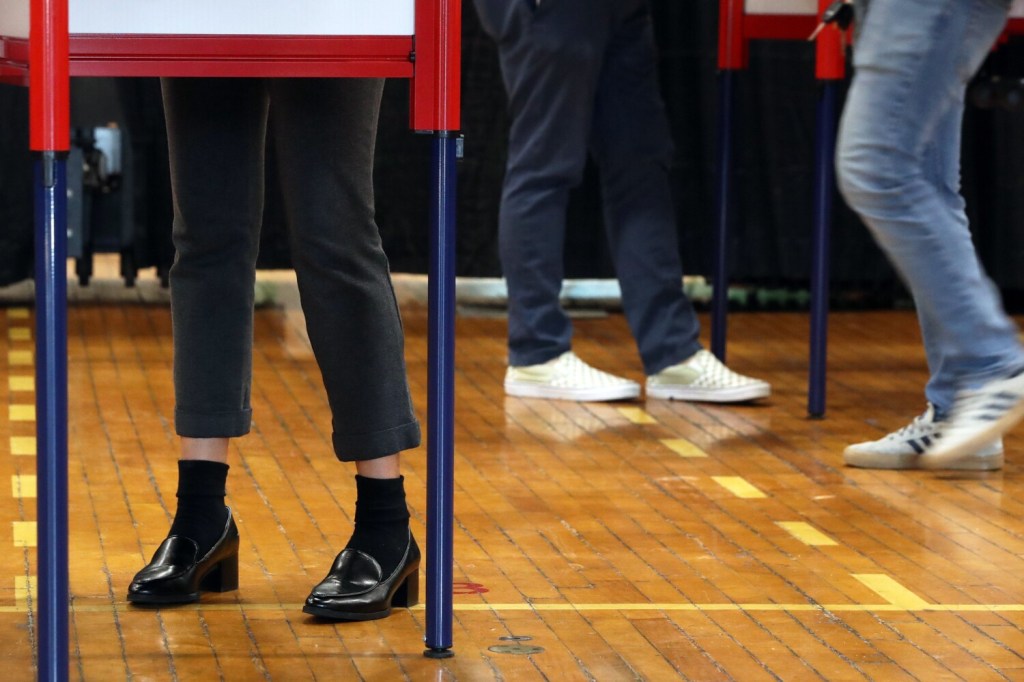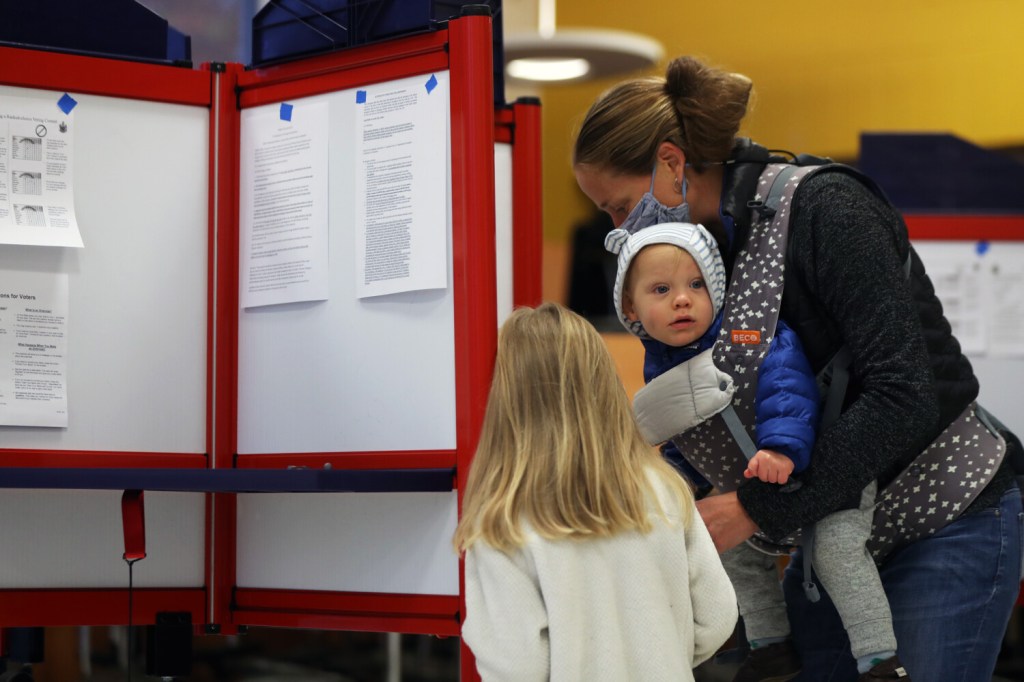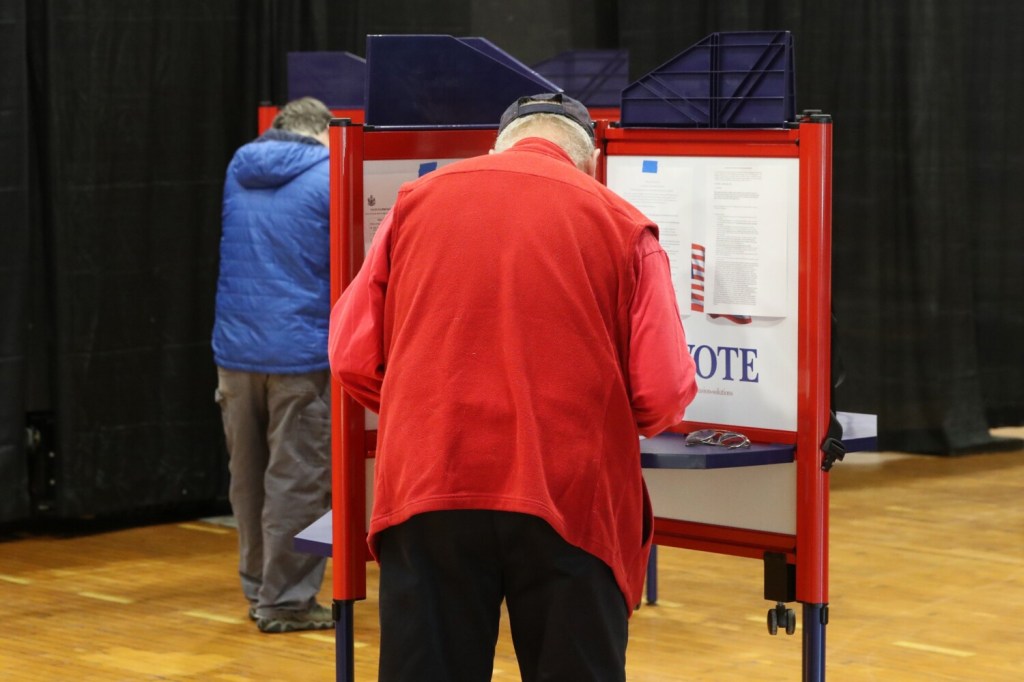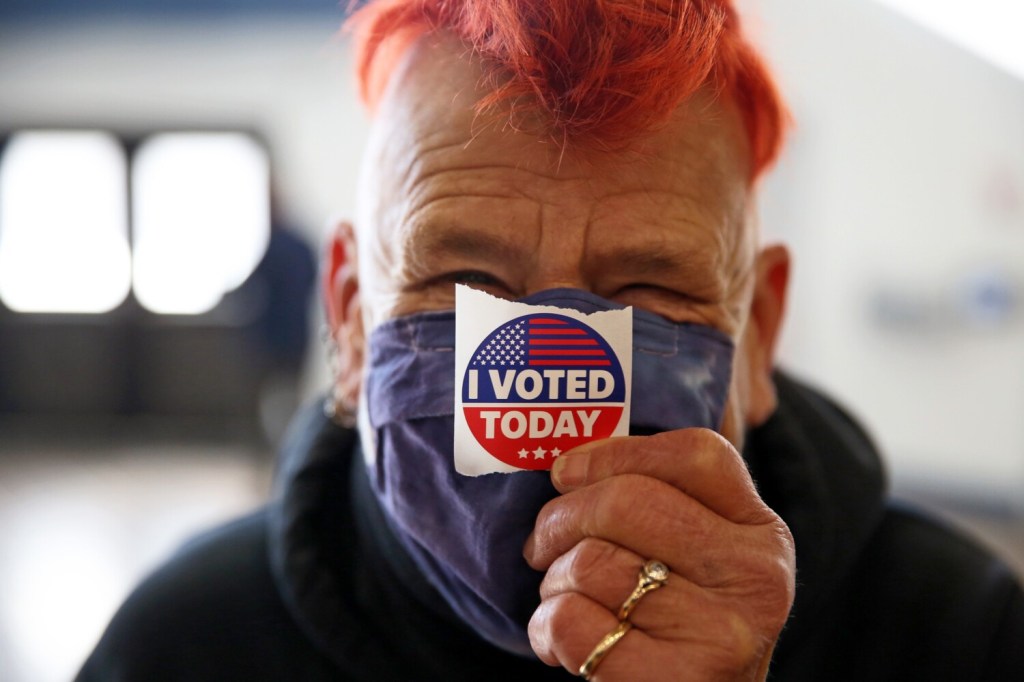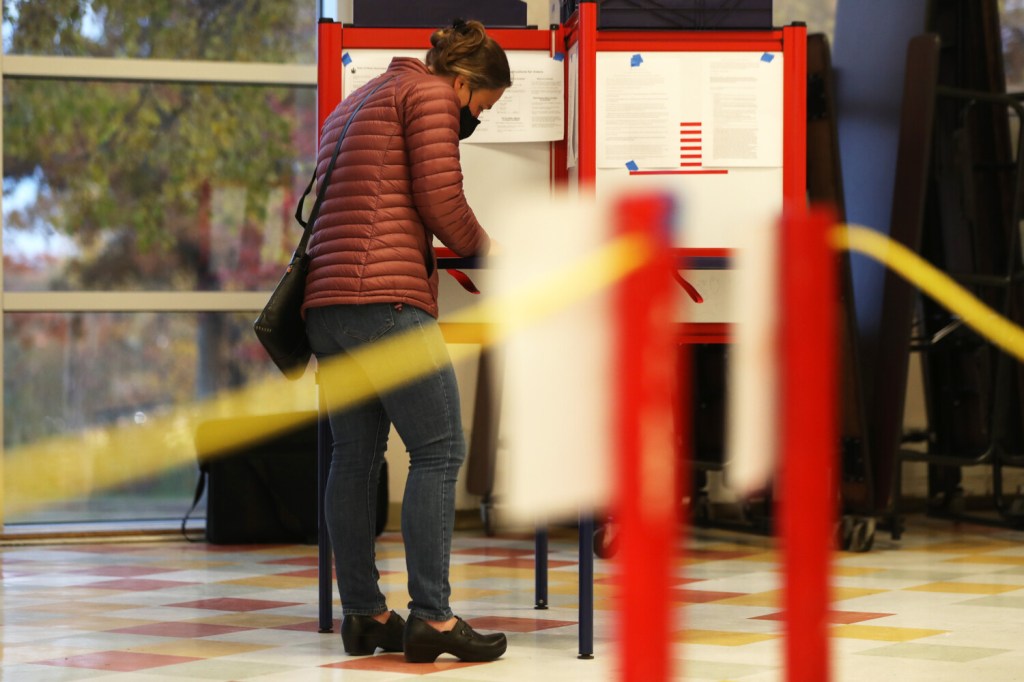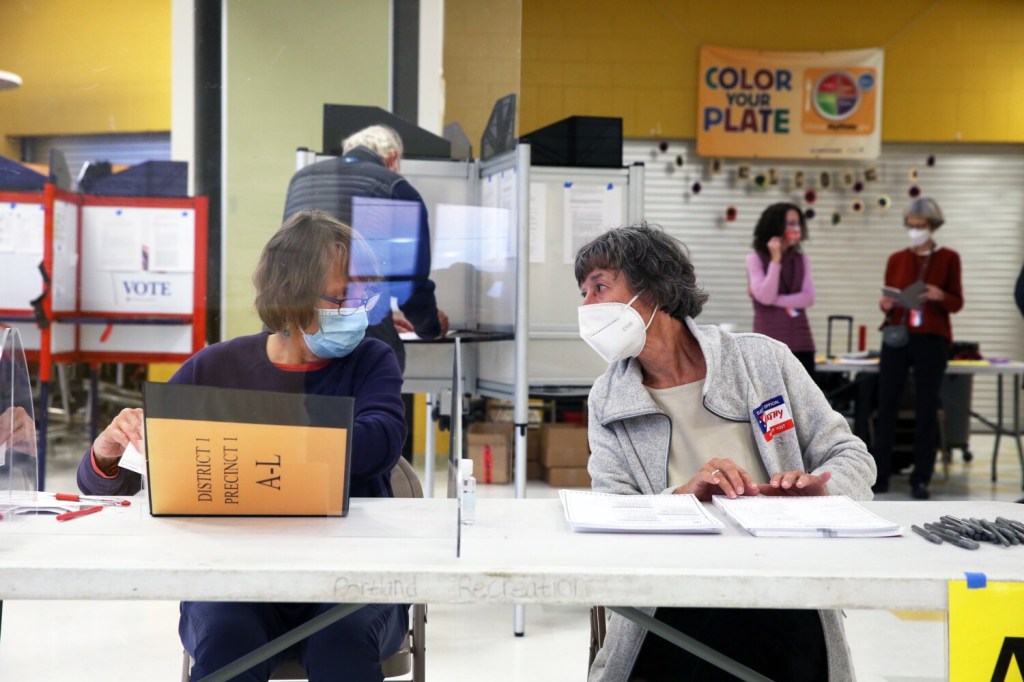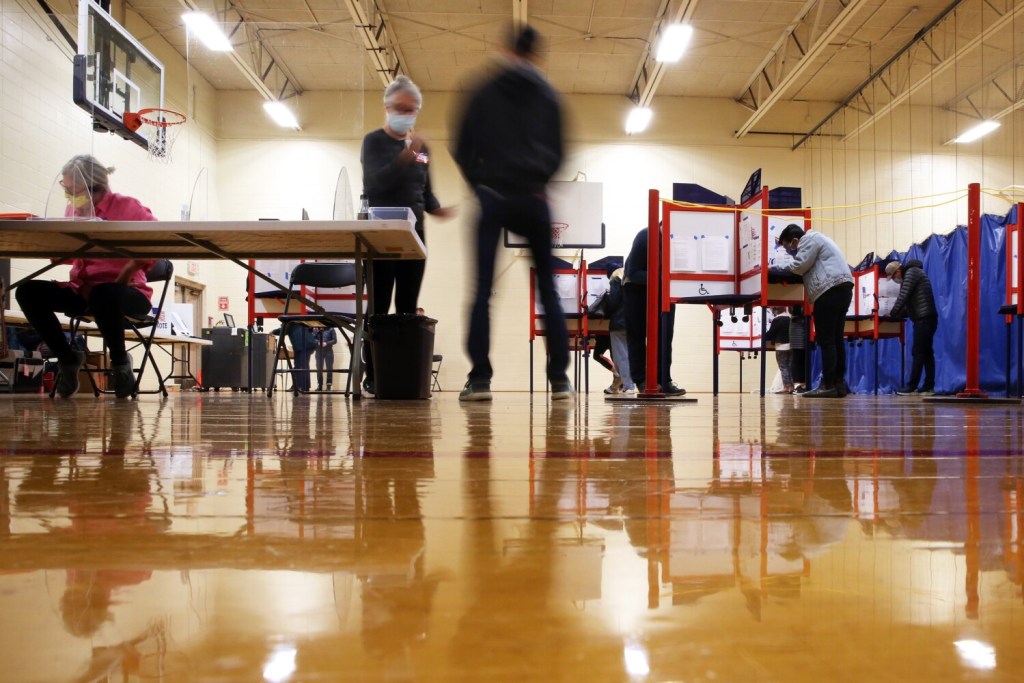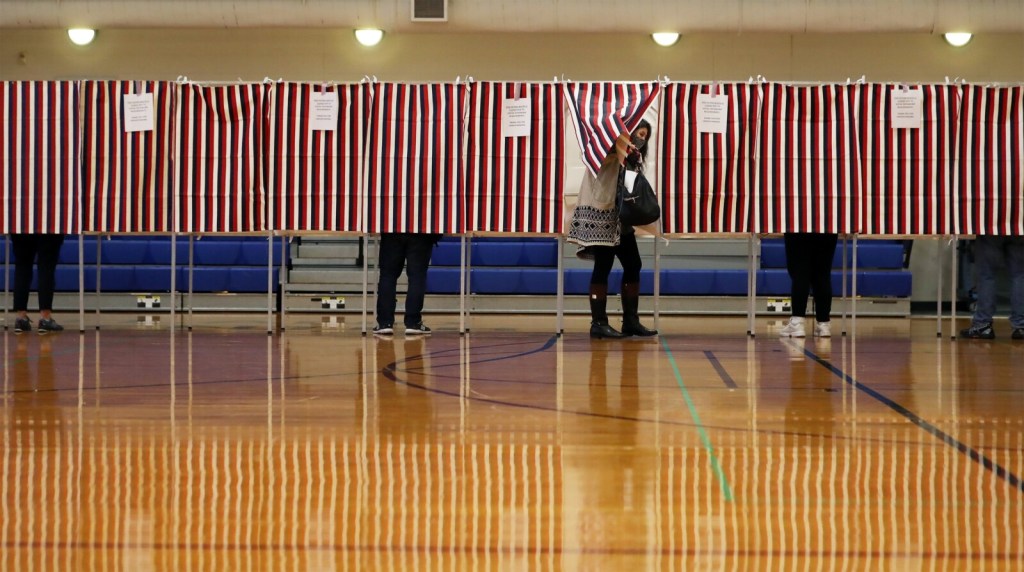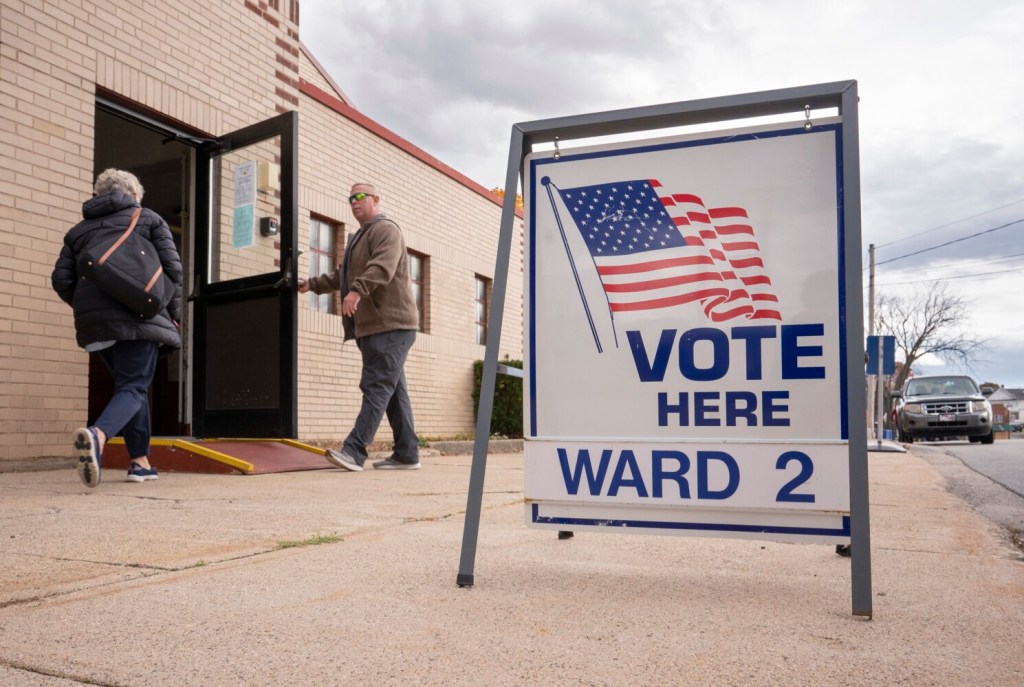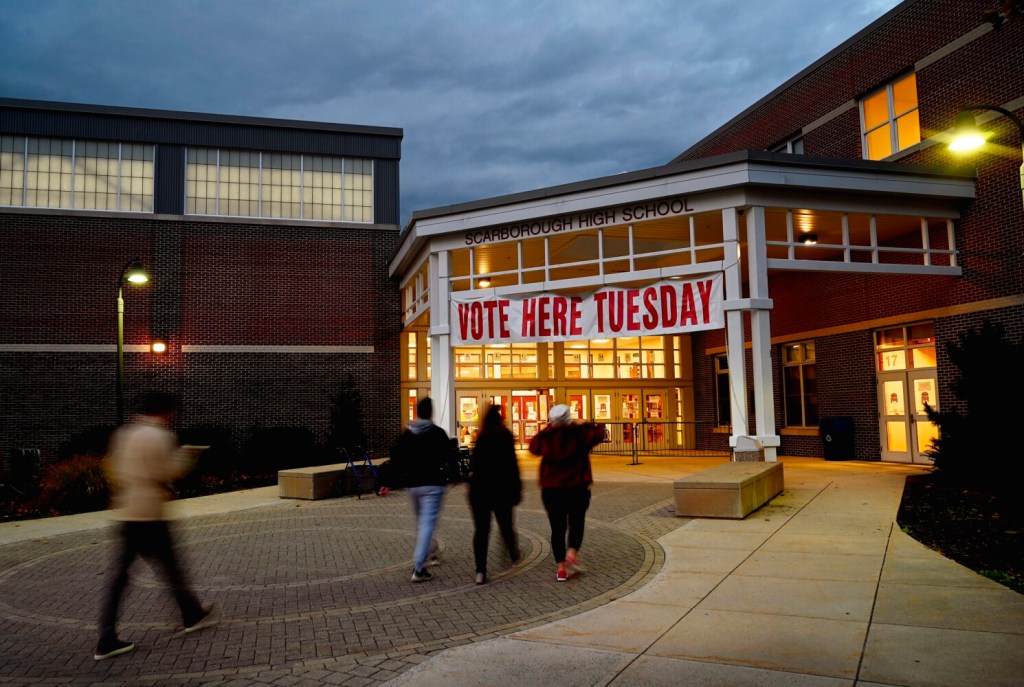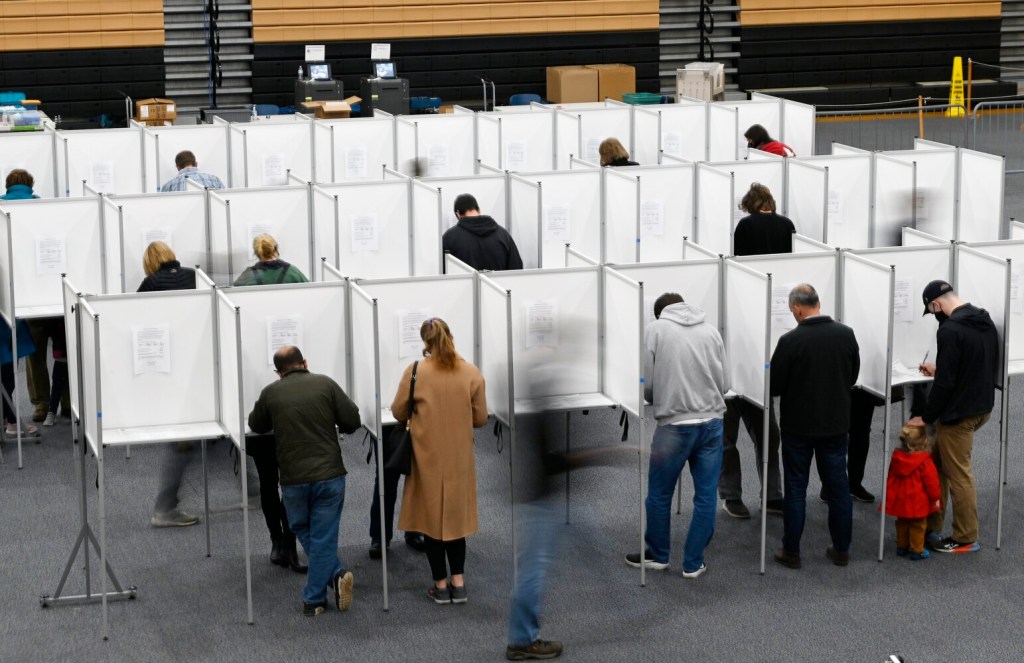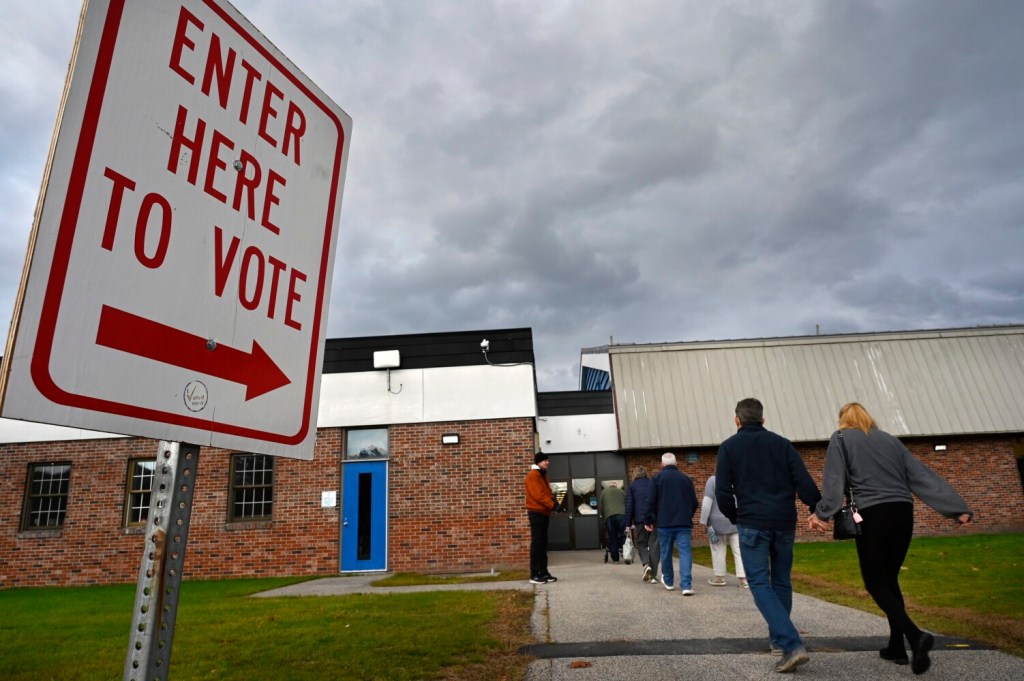Polls across Maine opened to a steady stream of foot traffic Tuesday as tens of thousands of voters cast ballots on the most expensive referendum campaign in state history.
More than $60 million has been spent to sway opinions on controversial Question 1, which asks voters whether they support or oppose Central Maine Power’s 145-mile transmission corridor stretching from Quebec to Lewiston.
A yes vote supports the initiative, which would prohibit “high-impact” power line construction in the Upper Kennebec region and give lawmakers the final say on similar projects anywhere in Maine, as well as power lines and various defined activities on public lands going back to 2014. A no vote opposes the ballot initiative and supports NECEC completing construction.
Initiative opponents argue the project could help reduce greenhouse emissions and raise additional funds for clean energy investments in Maine. Supporters claim the project will damage forests and fisheries and do little to combat climate change.
Voters also will be asked to decide two other state ballot initiatives. Question 2 is about a $100 million bond to build or improve roads, bridges, railroads, airports, transit facilities and ports, with the funds used to leverage an estimated $253 million in federal and other money. Question 3 asks voters to approve a constitutional amendment declaring the rights of all Mainers to grow, raise, harvest, produce and consume the food of their own choosing.
Secretary of State Shenna Bellows, who visited polling places in Portland, Lewiston and Old Town, said in a telephone interview Tuesday evening that election officials across Maine reported a steady voter turnout throughout the day.
Bellows said that a record number of absentee ballots – 105,156 – for a referendum-only election had been returned as of 6 p.m. Voters requested 120,588 absentee ballots and had until 8 p.m. to return them to local polling places or ballot collection boxes, she said.
While the number of absentee ballots in 2021 did not come close to the presidential election of 2020 when more than 500,000 absentee ballots were cast, Bellows said the 2021 absentee ballot numbers were impressive because there were no state or federal election races on the ballot.
In November 2020, Maine voters cast 514,429 absentee ballots; in November 2019, only 29,279 absentee ballots were returned; and in November 2017, a total of 54,615 Mainers voted absentee, according to the Secretary of State’s Office.
Bellows said it’s possible that the popularity of absentee voting will carry over into future elections. She said the ability to vote in advance of election day, which can be crowded and hectic, “seems to meet the necessities of modern day life.”
“Usually people vote absentee because they want to vote ahead of the election day, but I think the pandemic proved last year how accessible and convenient absentee balloting is,” Bellows said. “What is unclear is whether this trend will continue. Is absentee ballot simply more convenient or has voter behavior been changed by the pandemic?”
Bellows said she was not aware of any major voter problems or ballot glitches.
“This has been a smooth election,” she said at 7:30 p.m. Polls closed at 8 p.m.
The League of Women Voters of Maine, which positioned election observers at 63 polling locations across Maine, said in a statement issued Tuesday evening that Maine voters experienced a “free, safe and accessible election.”
BUSY BUT NO PROBLEMS
Observers said that there were only eight locations with a greater than 10-minute wait to vote. Observers also reported that many polling places had some forms of COVID precautions in place including poll workers, who wore masks, plexiglass barriers and social distancing in wait lines.
The Secretary of State’s Office does not release the total number of people who voted until all towns and cities have reported their officials results. That means it could take several more days before the state publishes final results.
Lines of voters formed early in the day at many polling places across the state as voters showed up to decide controversial local races and referendum questions.
Portland’s city clerk, Katherine Jones, confirmed what other towns were seeing.
“We were busy and there were steady lines most of the day,” Jones said Tuesday evening.
In Portland, election warden Carol Morrissette said a couple hundred voters had shown up in the first three hours of the day at Merrill Auditorium.
“Slow and steady,” she said, adding that she expected the pace to pick up in the evening.
Cynthia Rulman, 58, said she came out to vote no on Question 1. She felt strongly that she wanted to oppose any retroactive laws, she said, and she also agrees with the corridor as a clean energy project.
“We need to clean up the planet,” said Rulman, who works as a chef.
John Santoro, 60, said Question 1 was “a tough one to sort out.” He ultimately decided to vote yes to oppose the corridor. He said he wants to tap into hydropower but didn’t feel this project came with enough benefits for Maine.
“It seems like none of that power is going to come to Maine,” said Santoro, who is retired.
In Brunswick shortly after 9 a.m. Tuesday, traffic was steady and even heavy for an off-year election, officials said.
The stream of voters represented a mix of mostly older residents and parents who toted young children along. Because the town uses Brunswick Junior High as its polling place, schools are closed on Election Day.
Jean Cyr, 77, said she votes in every election but was excited this year to vote for someone she knows who’s running for school board.
QUESTION 1 DRAWS VOTERS
As for the statewide questions, she found them to be confusing, especially Question 1.
“All I know is, it’s going to be wonderful to never have to hear all those commercials again,” Cyr said. “All that money spent, and for what?”
Brian Wardwell, 26, said he doesn’t vote in every election but was motivated to vote yes on Question 1. He said the more he learned about the CMP corridor, and the process that led to its approval, the more strongly he felt that it should be stopped.
“I think the private sector can still have a role in clean energy production, but there needs to be a balance and I don’t think this represents that,” Wardwell said.
Streams of voters flowed into polling stations in Biddeford and Saco through midmorning, many motivated by Question 1 on the ballot.
Timothy Callnan, 70, of Biddeford, said he voted yes against CMP’s power corridor, for a plain reason.
“I don’t want to cut down all the trees, it’s really pretty simple,” he said.

Gabriel Demaine holds up a sticker after voting on Tuesday morning at the Portland Expo. Ben McCanna/Staff Photographer
Polls at Biddeford High School were busy all morning, City Clerk Carmen Morris said. The city received 2,300 absentee ballots before Election Day, a higher number than usual for an off-cycle election, she said.
“I think it will be steady all day. If absentee ballots speak anything to that, absolutely,” Morris said.
Lucienne Nulton, 80, said she came out to vote yes against the power line. She was not convinced by arguments that the corridor would bring clean power to the region and help reduce climate change-producing pollution.
“They always say that, but there’s always a trick behind it and I don’t trust it,” Nulton said. “I’ve been in Maine my whole life; I don’t want to see it destroyed.”

Jim Roche fills out his ballot on Tuesday at East End Community School in Portland. Ben McCanna/Staff Photographer
In Saco, vehicles jockeyed for sparse parking spaces in front of the Community Center polling station as masked voters went in and out of the building. A sign at the entrance notified voters that face masks were required, regardless of vaccination status.
Scott Morse, 54, said he always votes as a civic duty, but Question 1 especially motivated him to go to the polls Tuesday. Morse, a clinical social worker who leans left politically, decided to vote yes to ban the power corridor.
“I don’t like how our energy policy works and I don’t like how CMP is tied to foreign companies,” he said.
Gary Seavy, 69, another Saco voter, was leaning toward voting yes on Question 1, and an advertisement he called “misleading” from the no campaign made his decision easy, he said. He cited one ad tying oil and gas interests allegedly supporting the yes campaign to increased fuel prices.
“That’s completely irrelevant to the question,” Seavey said. “What really turned me off was the way the ‘No’ people advertised. It was an absolute barrage of bullpucky.”

Election clerks Linda Albert, left, and Kathleen Powers talk during early morning voting at East End Community School in Portland on Tuesday. Ben McCanna/Staff Photographer
SHELTER OPTIONS IN PORTLAND
Portland residents will choose from three options for limiting the size and locations of new homeless shelters, as well as tweaking other shelter rules. Option A would limit the size of most new shelters to 50 beds; Option B would limit the size to 150 beds, while also limiting how many shelters can be built near each other; and Option C is for none of the above, which would maintain existing rules and allow the city’s planned 208-bed homeless shelter and service center to be built in the Riverton neighborhood.
Portland voters also will decide a competitive race for the Portland City Council at-large seat, which opened after long-time councilor Nicholas Mavodones announced he would not seek re-election. Those looking to replace Mavodones are: Travis Curran, 35, a server and retail manager at Maine Craft Distilling who ran unsuccessfully for mayor in 2019; Brandon Mazer, 35, an attorney and chairman of the planning board; Roberto Rodriguez, 42, who owns an urban farming business and is serving his second term on the school board; and Stuart Tisdale, 68, an attorney and retired history and government teacher at Cheverus High School.
The at-large seat race could be decided by ranked-choice voting.
Incumbent Sarah Thompson’s name will appear on the municipal ballot for an at-large school board seat, but she announced in October that she had withdraw from the race, citing divisiveness in city politics and on the school board. Her withdrawal leaves Nyalat Biliew as the only candidate running for the at-large seat.
South Portland voters will elect two candidates to the City Council. Incumbent District 3 Councilor Misha Pride, who is serving as mayor this year, is being challenged in his bid for a second three-year term by longtime school board Chairman Richard Matthews. Seeking the District 4 seat are Linda Cohen and Margaret Brownlee.

Kathleen Reid, left, an election clerk at the Stewart P. Morrill American Legion Post 35 in South Portland, walks back into the hall after going outside for a breath of fresh air. She has been an election worker for 26 years. In the doorway, Jen Kirk thanks people for coming to vote. She is a friend of School Board Chairman Richard Matthews who is running for a city council seat against Mayor Misha Pride. Michele McDonald
Biddeford voters will choose the city’s next mayor. Biddeford Mayor Alan Casavant is looking for a sixth term and is being challenged by former City Councilor Victoria Foley. Both have previously served in the Maine Legislature.
In Westbrook, voters approved a referendum that will amend the city charter to allow the use of ranked-choice voting in the mayoral, City Council and school committee races.
Polling places across Maine will close at 8 p.m. Results will be posted throughout the evening and can be viewed at pressherald.com.
Send questions/comments to the editors.



